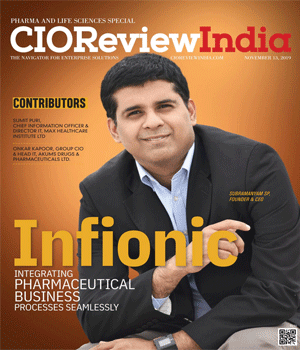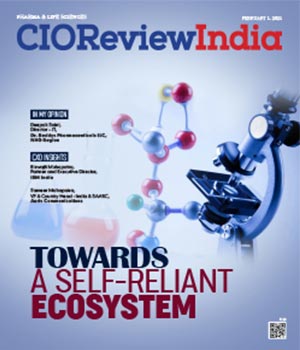
Technology and Big Data Shaping Digital Marketing in Pharmaceutical industry
Rajaram Iyer, VP, Mankind Pharma | Wednesday, 20 September 2017, 05:22 IST
 Technology has had a profound impact on the pharmaceutical industry. All the key functions have undergone significant change. With respect to marketing, technology and data have helped the marketing function to market its products more effectively.
Technology has had a profound impact on the pharmaceutical industry. All the key functions have undergone significant change. With respect to marketing, technology and data have helped the marketing function to market its products more effectively.
With digital marketing, the diversity of media channels through which pharmaceutical companies can reach out to physicians and patients is fast changing and expanding. Earlier (non-digital) the focus of pharmaceutical marketing was focused only towards physicians, however with digital marketing, the focus has shifted from physicians to patients and the communication which was one way earlier (companies to physician) has become two-way. With this two-way communication, patients are also sharing a lot of data which is very helpful in making pharmaceutical companies understand the product effectiveness and provide great knowledge repository for new drug discovery. There is enormous amount of data which is being generated via these communications and hence it becomes important for pharmaceutical companies to analyze this data using the right technology and use it productively for improving patient care.
Apart from marketing, technology had a very profound impact on the research. Starting with drug discovery where technology had enabled the drug design and has improved the hit rate of the molecules thereby reducing the cost. The other significant impact is seen on the clinical research where data management has become easy and data analysis has helped in identifying correct disease patterns, and correlation between co-morbid conditions have become easy.
Automation Transforming the Pharmaceutical Industry
The pharmaceutical industry is highly regulated and companies need to work in a narrow realm of guidelines and regulation. This means that they need to keep proper trail of all the work they do. Automation will help as there will be proper trail of all the work and analysis which is being done to get the drug to the market. Industry will not have to maintain realms of paper or audit trail to show it to regulators as all of that data can be retrieved via computer.
Automation will have a significant impact on the manufacturing and supply chain as the productivity will go up and errors will be less.
Another important area where automation will have profound impact is the R&D. In the pharma research there are multiple tasks which are to be carried out repeatedly especially in the analytical chemistry/instrumentation. Automated instruments with the capability of sample processing and analysis will go a long way in reducing the sample testing time and increasing the throughput, thereby improving the changes of success.
Trends impacting Pharma & life sciences industry
There are several trends which are shaping the pharmaceutical industry and some of them are changing the complexion more intensely. One of the key themes is use of technology and digital mediums. There are multiple trends within that space viz.,
1. CENTER OF GRAVITY IS SHIFTING TOWARDS PATIENTS: With the advent of digital marketing, patient is taking a center stage and internet and other web portals are becoming a key influencer in decision-making
2. OUTCOME IS ‘IN’: Payers (insurance companies and governments) will be demanding the real outcome data for the new drugs to get reimbursed. They will start demanding real-world evidence for drugs efficacy (and not just the clinical trial data).
3. EVOLVING DEFINITION OF HEALTHCARE: Healthcare is moving away from solving the immediate problem (disease) to a more holistic and preventive healthcare. Focus of healthcare providers and insurance companies is moving towards preventing a disease by using predictive analytical tools and by patient education. This will also entail lot of integrated care where experts from various field will come and solve healthcare needs.
How to utilize cloud platform and make better decisions?
There is no doubt that applications on cloud can help in making various healthcare related applications reach to a wider audience and also in a cost effective manner. Initially, health data (personal health data or data by insurance companies or in clinical trials) on cloud had lot of skepticism with respect to piracy, data leak, insurance misusing the data etc; however, cloud has been able to successfully overcome those barriers and has reached a stage where it is becoming acceptable by all i.e. patients, healthcare providers and payers. Now the industry has recognized that, cloud is the new normal and rather than thinking about problems with cloud, industry is thinking about how best to utilize cloud platform and make better decisions.
Big data revolutionizing R&D in Pharma industry
‘Data is the new natural resource’ and in the times to come, data is what will be the biggest differentiator. Pharma industry is no different and will be highly influenced by the data.
As with any industry, data helps the pharma industry in multiple facets. Marketing uses data to understand physicians’ preferences; supply chain uses data to understand and optimize inventory levels. However, a key area where pharmaceutical industry is using data in a big way is in R&D and clinical trials. A clinical trial is an area where big data is being used very effectively and is giving a positive outcome. Clinical trials are studies which are conducted on patients to study a drug’s effectiveness and this generates lot of data, not only with respect to the indication for which it is being studied, but for its other effects. Analysis of large pools of data can throw very interesting insights on drugs behavior. Meta-analysis (analysis done after the trials are completed) also helps in understanding drug’s side effects and efficacy. Another area where data will be helpful is in drug screening. When a new drug is being discovered, scientists have to screen millions of compounds to pick the right candidate which can become drug and big data can help us here. The biggest help big data analysis can do is in predicting the risk profile of the drug
Providing integrated healthcare by engaging all the stakeholders
Digital is the new normal. Technology has changed the way healthcare is delivered and the question is not if you would like to participate but the question is one of survival, in case you don’t. Digital is changing the narrative of the pharmaceutical industry and in the new digital world, pharmaceutical companies will have to focus on two key things: one is providing integrated healthcare and the second one is in engaging all the stakeholders i.e. patients, physicians, and government.
With all the new technologies and the new companies offering them, incumbent pharmaceutical players will have to collaborate innovatively, so that they are able to offer a much better outcome based care.
CIO Viewpoint
Paving the Way for Digital Transformation of...
By Abhrasnata Das
Leveraging IT to ensure Data Integrity in...
By By Deepak Saini,Director – IT,Dr. Reddys Pharmaceuticals LLC, NAG Region
How Is Technology Disrupting The Pharma And...
By Onkar Kapoor, Group CIO & Head IT, Akums Drugs & Pharmaceuticals Ltd.
CXO Insights
The Growing Importance Of Supply Chain...
By Gustavo Salem, Group President, IDEX Health & Science LLC
A Symbiosis Of Technology And Nature
By Amanda L. Goltz, Vice President, Digital Innovation, BTG
Next-Generation Commercial Data Management...



.jpg)
.jpg)
.jpg)





